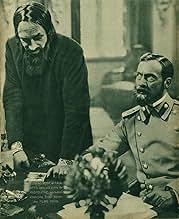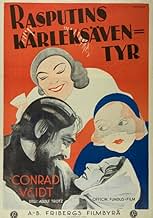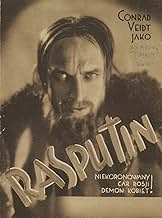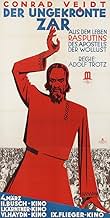Ajouter une intrigue dans votre langueThe demonic Rasputin is poisoned but survives to continue seducing in evil ways, in this historical thriller.The demonic Rasputin is poisoned but survives to continue seducing in evil ways, in this historical thriller.The demonic Rasputin is poisoned but survives to continue seducing in evil ways, in this historical thriller.
Kenneth Rive
- Zarewitsch Alioscha
- (as Kenny Rive)
Histoire
Le saviez-vous
- AnecdotesGerman censorship certificate delivered on 19-2-1932.
- ConnexionsVersion of Rasputin, the Black Monk (1917)
Commentaire à la une
Maria Rasputin (who may or may not have been Rasputin's daughter) said watching Veidt's performance was like seeing her father resurrected, his portrayal was so eerily accurate. Veidt's gestures- whether in his eyes, with his hands, or how he obsessively smokes a cigarette- take the viewer far beyond the script's rather obvious limitations.
When Veidt heals the Tsarevitch (Kenneth Rive), the interaction between the two is genuinely poignant. During the assassination, Veidt conveys the sense that the character he plays might have been seriously misunderstood not just by the audience, but by the filmmakers themselves.
Veidt's Rasputin is alternately dissolute, menacing, or touching. As an actor he has the ability to turn on a dime, a talent he put to use in a comparable pantomime eight year's earlier as Ivan the Terrible in Paul Leni's 'Waxworks'.
With women, Veidt conveys capriciousness bordering on cruelty- one asks the return of her garter, Veidt carelessly gives her the wrong one. And while otherwise the film excels at few things, it gives an excellent sense of eroticism- these days a lost art.
Scriptwriter Osip Dymov (Yosif Isidorovich Perelman) apparently knew the titular character- which true did him no favors. The result is little more than prosaic.
As a director, Adolf Trotz is no match for Paul Leni, as the film suffers from a number of foundational flaws. First, there is no character development- Rasputin does not evolve in anyway throughout the film. The real man, in contrast, changed quite a bit during his ten years in St. Petersburg- unfortunately not for the better.
Also missing is point of view. With each scene, the director knows exactly which character the audience identifies with- providing a sense of interpretation (something along the lines of a narrator in a novel). Not so here. Scenes follow each other haphazardly- and while a few are quite memorable, overall the film lacks cohesion. The result is oddly distancing and not at all compelling in spite of Veidt.
'Rasputin: Dämon der Frauen' should be considered in its historical context- early 1930s Berlin. Rasputin was a mystic with genuine religious beliefs, and his healings appear miraculous even by today's standards. All are glossed over in the film, with Rasputin's pacifism and debauchery emphasized instead.
'Rasputin' adds up to a portrait of demimonde Petrograd at a time when catastrophe appeared on the horizon. One cannot help but wonder how well this fits early 1930s Berlin, when even the most jaded eyes could foresee disaster- ushered in by a charismatic figure of an entirely different sort.
When Veidt heals the Tsarevitch (Kenneth Rive), the interaction between the two is genuinely poignant. During the assassination, Veidt conveys the sense that the character he plays might have been seriously misunderstood not just by the audience, but by the filmmakers themselves.
Veidt's Rasputin is alternately dissolute, menacing, or touching. As an actor he has the ability to turn on a dime, a talent he put to use in a comparable pantomime eight year's earlier as Ivan the Terrible in Paul Leni's 'Waxworks'.
With women, Veidt conveys capriciousness bordering on cruelty- one asks the return of her garter, Veidt carelessly gives her the wrong one. And while otherwise the film excels at few things, it gives an excellent sense of eroticism- these days a lost art.
Scriptwriter Osip Dymov (Yosif Isidorovich Perelman) apparently knew the titular character- which true did him no favors. The result is little more than prosaic.
As a director, Adolf Trotz is no match for Paul Leni, as the film suffers from a number of foundational flaws. First, there is no character development- Rasputin does not evolve in anyway throughout the film. The real man, in contrast, changed quite a bit during his ten years in St. Petersburg- unfortunately not for the better.
Also missing is point of view. With each scene, the director knows exactly which character the audience identifies with- providing a sense of interpretation (something along the lines of a narrator in a novel). Not so here. Scenes follow each other haphazardly- and while a few are quite memorable, overall the film lacks cohesion. The result is oddly distancing and not at all compelling in spite of Veidt.
'Rasputin: Dämon der Frauen' should be considered in its historical context- early 1930s Berlin. Rasputin was a mystic with genuine religious beliefs, and his healings appear miraculous even by today's standards. All are glossed over in the film, with Rasputin's pacifism and debauchery emphasized instead.
'Rasputin' adds up to a portrait of demimonde Petrograd at a time when catastrophe appeared on the horizon. One cannot help but wonder how well this fits early 1930s Berlin, when even the most jaded eyes could foresee disaster- ushered in by a charismatic figure of an entirely different sort.
Meilleurs choix
Connectez-vous pour évaluer et suivre la liste de favoris afin de recevoir des recommandations personnalisées
Détails
- Date de sortie
- Pays d’origine
- Langue
- Aussi connu sous le nom de
- Rasputin, Demon with Women
- Société de production
- Voir plus de crédits d'entreprise sur IMDbPro
- Durée1 heure 22 minutes
- Couleur
- Rapport de forme
- 1.37 : 1
Contribuer à cette page
Suggérer une modification ou ajouter du contenu manquant

Lacune principale
By what name was Raspoutine (1932) officially released in Canada in English?
Répondre















